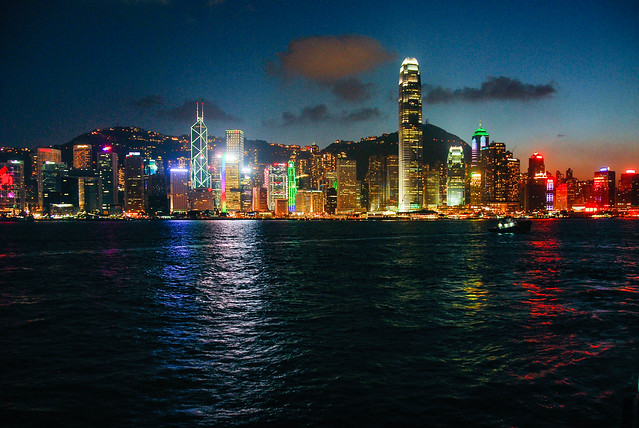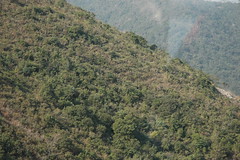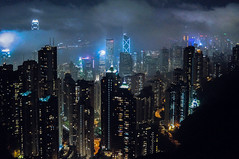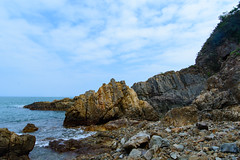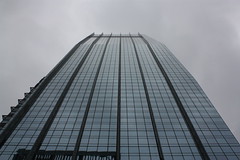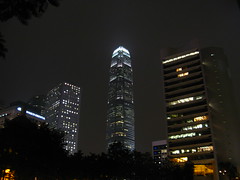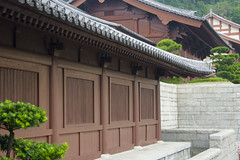 Hong Kong
Hong Kong
Hong Kong (English: /'hQNkQN/ or English: /hQN'kQN/;), officially the Hong Kong Special Administrative Region of the People's Republic of China (abbr. Hong Kong SAR or HKSAR), is a city and special administrative region of China on the eastern Pearl River Delta in South China. With 7.5 million residents of various nationalities in a territory, Hong Kong is one of the most densely populated places in the world. Hong Kong is also a major global financial centre and one of the most developed cities in the world.
Hong Kong was established as a colony of the British Empire after the Qing Empire ceded Hong Kong Island from Xin'an County at the end of the First Opium War in 1841 then again in 1842. The colony expanded to the Kowloon Peninsula in 1860 after the Second Opium War and was further extended when Britain obtained a 99-year lease of the New Territories in 1898. British Hong Kong was occupied by Imperial Japan from 1941 to 1945 during World War II; British administration resumed after the surrender of Japan. The whole territory was transferred to China in 1997. As one of China's two special administrative regions (the other being Macau), Hong Kong maintains separate governing and economic systems from that of mainland China under the principle of "one country, two systems".
Originally a sparsely populated area of farming and fishing villages, the territory has become one of the world's most significant financial centres and commercial ports. As of 2021, it is the world's ninth-largest exporter and eight-largest importer. Hong Kong has a market economy characterised by a focus on services, low taxation and free trade; its currency, the Hong Kong dollar, is the eighth most traded currency in the world. Hong Kong is home to the third-highest number of billionaires of any city in the world, the second-highest number of billionaires of any city in Asia, and the largest concentration of ultra high-net-worth individuals of any city in the world. Although the city has one of the highest per capita incomes in the world, severe income inequality exists among the population. Most notably, housing in Hong Kong has been well-documented to experience a chronic persistent shortage; the extremely compact house sizes and the extremely high housing density are the effects of Hong Kong's housing market being the most expensive housing in the world.
Hong Kong is a highly developed territory and has a Human Development Index (HDI) of 0.952, ranking fourth in the world. The city has the largest number of skyscrapers of any city in the world, and its residents have some of the highest life expectancies in the world. The dense space has led to a highly developed transportation network with public transport rates exceeding 90%. Hong Kong is ranked 3rd in the Global Financial Centres Index.
Etymology
The name of the territory, first romanised as "He-Ong-Kong" in 1780, originally referred to a small inlet located between Aberdeen Island and the southern coast of Hong Kong Island. Aberdeen was an initial point of contact between British sailors and local fishermen. Although the source of the romanised name is unknown, it is generally believed to be an early phonetic rendering of the Cantonese (or Tanka Cantonese) phrase hēung góng. The name translates as "fragrant harbour" or "incense harbour". "Fragrant" may refer to the sweet taste of the harbour's freshwater influx from the Pearl River or to the odour from incense factories lining the coast of northern Kowloon. The incense was stored near Aberdeen Harbour for export before Victoria Harbour was developed. Sir John Davis (the second colonial governor) offered an alternative origin; Davis said that the name derived from "Hoong-keang" ("red torrent"), reflecting the colour of soil over which a waterfall on the island flowed.
The simplified name Hong Kong was frequently used by 1810. The name was also commonly written as the single word Hongkong until 1926, when the government officially adopted the two-word name. Some corporations founded during the early colonial era still keep this name, including Hongkong Land, Hongkong Electric Company, Hongkong and Shanghai Hotels and the Hongkong and Shanghai Banking Corporation (HSBC).
History
Prehistory and Imperial China
Earliest known human traces in what is now Hong Kong are dated by some to 35,000 and 39,000 years ago during the Paleolithic period. The claim is based on an archaeological investigation in Wong Tei Tung, Sai Kung in 2003. The archaeological works revealed knapped stone tools from deposits that were dated using optical luminescence dating.
During the Middle Neolithic period, about 6,000 years ago, the region had been widely occupied by humans. Neolithic to Bronze Age Hong Kong settlers were semi-coastal people. Early inhabitants are believed to be Austronesians in the Middle Neolithic period and later the Yueh people. As hinted by the archaeological works in Sha Ha, Sai Kung, rice cultivation had been introduced since Late Neolithic period. Bronze Age Hong Kong featured coarse pottery, hard pottery, quartz and stone jewelry, as well as small bronze implements.
The Qin dynasty incorporated the Hong Kong area into China for the first time in 214 BCE, after conquering the indigenous Baiyue. The region was consolidated under the Nanyue kingdom (a predecessor state of Vietnam) after the Qin collapse and recaptured by China after the Han conquest. During the Mongol conquest of China in the 13th century, the Southern Song court was briefly located in modern-day Kowloon City (the Sung Wong Toi site) before its final defeat in the 1279 Battle of Yamen. By the end of the Yuan dynasty, seven large families had settled in the region and owned most of the land. Settlers from nearby provinces migrated to Kowloon throughout the Ming dynasty.
The earliest European visitor was Portuguese explorer Jorge Álvares, who arrived in 1513. Portuguese merchants established a trading post called Tamão in Hong Kong waters and began regular trade with southern China. Although the traders were expelled after military clashes in the 1520s, Portuguese-Chinese trade relations were re-established by 1549. Portugal acquired a permanent lease for Macau in 1557.
After the Qing conquest, maritime trade was banned under the Haijin policies. From 1661 to 1683, the population of most of the area forming present day Hong Kong was cleared under the Great Clearance, turning the region into a wasteland. The Kangxi Emperor lifted the maritime trade prohibition, allowing foreigners to enter Chinese ports in 1684. Qing authorities established the Canton System in 1757 to regulate trade more strictly, restricting non-Russian ships to the port of Canton. Although European demand for Chinese commodities like tea, silk, and porcelain was high, Chinese interest in European manufactured goods was insignificant, so that Chinese goods could only be bought with precious metals. To reduce the trade imbalance, the British sold large amounts of Indian opium to China. Faced with a drug crisis, Qing officials pursued ever more aggressive actions to halt the opium trade.
British colony
In 1839, the Daoguang Emperor rejected proposals to legalise and tax opium and ordered imperial commissioner Lin Zexu to eradicate the opium trade. The commissioner destroyed opium stockpiles and halted all foreign trade, triggering a British military response and the First Opium War. The Qing surrendered early in the war and ceded Hong Kong Island in the Convention of Chuenpi. British forces began controlling Hong Kong shortly after the signing of the convention, from 26 January 1841. However, both countries were dissatisfied and did not ratify the agreement. After more than a year of further hostilities, Hong Kong Island was formally ceded to the United Kingdom in the 1842 Treaty of Nanking.
Administrative infrastructure was quickly built by early 1842, but piracy, disease, and hostile Qing policies initially prevented the government from attracting commerce. Conditions on the island improved during the Taiping Rebellion in the 1850s, when many Chinese refugees, including wealthy merchants, fled mainland turbulence and settled in the colony. Further tensions between the British and Qing over the opium trade escalated into the Second Opium War. The Qing were again defeated and forced to give up Kowloon Peninsula and Stonecutters Island in the Convention of Peking. By the end of this war, Hong Kong had evolved from a transient colonial outpost into a major entrepôt. Rapid economic improvement during the 1850s attracted foreign investment, as potential stakeholders became more confident in Hong Kong's future.
The colony was further expanded in 1898 when Britain obtained a 99-year lease of the New Territories. The University of Hong Kong was established in 1911 as the territory's first institution of higher education. Kai Tak Airport began operation in 1924, and the colony avoided a prolonged economic downturn after the 1925–26 Canton–Hong Kong strike. At the start of the Second Sino-Japanese War in 1937, Governor Geoffry Northcote declared Hong Kong a neutral zone to safeguard its status as a free port. The colonial government prepared for a possible attack, evacuating all British women and children in 1940. The Imperial Japanese Army attacked Hong Kong on 8 December 1941, the same morning as its attack on Pearl Harbor. Hong Kong was occupied by Japan for almost four years before Britain resumed control on 30 August 1945.
Its population rebounded quickly after the war, as skilled Chinese migrants fled from the Chinese Civil War and more refugees crossed the border when the Chinese Communist Party took control of mainland China in 1949. Hong Kong became the first of the Four Asian Tiger economies to industrialise during the 1950s. With a rapidly increasing population, the colonial government attempted reforms to improve infrastructure and public services. The public-housing estate programme, Independent Commission Against …
Looking for places related to Hong Kong?
Those are other destinations to find places related to Hong Kong:
